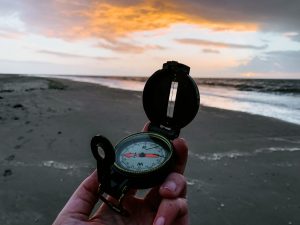
One major impetus for revitalizing the University Core was to provide more opportunities for creative interdisciplinary courses that could include a wide variety of perspectives, including points where the liberal arts meet professional disciplines. This was of interest to students, faculty, and administration alike, and it resulted in a proposed new “Exploration Level” of courses to follow the Foundation Level (with the Foundation Level itself being evolution of the current Core focused on introducing disciplinary lenses).
UP faculty have seemed excited about the concept: after getting a foundation in the liberal arts, every UP student will take two courses that creatively integrate multiple Core Habits to explore timely and timeless issues of ongoing concern — sometimes through team-teaching, linked courses, or other ways of connecting across disciplines. While the Foundation Level should provide broad ‘ways of knowing’ from the liberal arts, the Exploration Level should use those ways of knowing to enable ‘ways of understanding and creating’ that are relevant to students’ lives and our society. How can we draw on different ways of knowing to better understand creative problem solving, or immigration and globalization, or justice and inequality, or what it means to live a good life, or the role of rituals in our lives, or any other of the many possible topics that deserve attention in a UP education?
Now it’s time to ask those questions and put the Exploration Level concept into practice. These evolved and new courses are going to phase into the Core in the Fall of 2022, which means Exploration Level courses need to be ready for schedule submission in the Fall of 2021. This, in turn, means the time is now to imagine and design Exploration Level courses.
While the final details of Exploration Level course types and criteria are still working through approval processes with the Curriculum and Academic Regulations (CAR) committee of the Academic Senate, a draft version is available for UP faculty and staff on pilots.up.edu/group/core-curriculum. But in hopes of sparking the type of creative thinking and updating that often happens for our courses in the summer, below is a brief summary of how we hope faculty can help enact their expressed interest in Exploration Level courses.
First, it is worth emphasizing that to be able to offer enough Exploration Level courses to make this work, many will necessarily be evolutions of current upper-division courses that are accessible for non-majors. Many of the current 300 level Theology classes, for example, will likely transition to become Exploration Level offerings (though a 300 level Theology class will non longer be a Core requirement, we expect many students will continue to take an upper-division course with Theological dimensions). Likewise, we hope many History classes, Environmental Science classes, and any other of the many 300 level courses that lend themselves to interdisciplinary inquiry will offer at least some Exploration Level seats. These courses will need to demonstrate how they will address multiple Core Habits, and will need to be approved by the Undergraduate Core Curriculum Committee and the Core Director. But we hope this provides a useful chance for faculty to think about how they are, and could be, interdisciplinary in their current courses.
Other Exploration Level courses will also build off and hopefully go beyond existing models. These should include team-taught courses (such as Theological Perspectives courses), linked courses (such as courses from English and Environmental Sciences that have been intentionally linked around themes of food), and even what we are thinking of as University Big Ideas courses (such as the Imagining our Futures class which drew on more than a dozen faculty to offer multi-disciplinary perspectives on COVID-19, Black Lives Matter, and climate change). These types of courses are all described further in documents on pilots.up.edu, and will be the subject of upcoming workshops. There are also some small course development funds available to faculty interested in significantly updating existing courses or developing new courses for the Exploration Level — please see information on the pilots.up.edu Core page and also feel free to reach out to Andrew Guest (guesta@up.edu) in his Core Director role for more information.
We will start approving these courses in the Fall of 2021 so they can be put on the schedule for Fall of 2022 — though only first-year students entering in the Fall of 21 or after will have to fulfill Exploration Level requirements. In other words, the courses will be phased in over the course of about three years until all UP students need to fulfill the revitalized Core requirements. So we should have some time to work out the details, and to learn what works best. But we don’t have any time to waste in imagining (and re-imagining) what our own future Exploration Level courses could look like.
